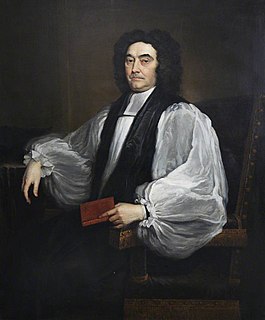Robert Welsted (1671–1735) was an English physician and classical scholar.
Contents

Robert Welsted (1671–1735) was an English physician and classical scholar.

He was the son of Leonard Welsted of Bristol. He matriculated from St Edmund Hall, Oxford, on 4 December 1687, and was elected in 1689 to a demyship at Magdalen College, which he held till 1698, graduating B.A. on 25 June 1691, and M.A. on 12 May 1694. He was admitted an extra-licentiate of the London College of Physicians on 11 December 1695. He was then practising medicine at Bristol, where he remained for some years; when he later moved to London, he was admitted a licentiate on 3 September 1710. [3]

Bristol is a city and county in South West England with a population of 459,300. The wider district has the 10th-largest population in England. The urban area population of 724,000 is the 8th-largest in the UK. The city borders North Somerset and South Gloucestershire, with the cities of Bath and Gloucester to the south-east and north-east, respectively. South Wales lies across the Severn estuary.

St Edmund Hall is a constituent college of the University of Oxford in England. The college has a claim to be "the oldest academical society for the education of undergraduates in any university" and is the last surviving medieval hall at the University.
A demyship is a form of scholarship at Magdalen College, Oxford. It is derived from demi-socii or half-fellows.
Welsted was admitted a Fellow of the Royal Society on 20 March 1718. In his later years his London practice dropped away, and he relied on charity from his friend Hugh Boulter. [4] He died at Tavistock Street, London, on 1 February 1735. [3]

Fellowship of the Royal Society is an award granted to individuals that the Royal Society of London judges to have made a 'substantial contribution to the improvement of natural knowledge, including mathematics, engineering science and medical science'.

Hugh Boulter was the Church of Ireland Archbishop of Armagh, the Primate of All Ireland, from 1724 until his death. He also served as the chaplain to George I from 1719.
Welsted was the author of: [3]

Stephen Weston (1665–1742) was an English bishop and educator.
Sir David Hamilton, FRS, MD was a Scottish physician to Queen Anne, during which appointment he kept a diary.
Edward Shortland (1812–1893) was a New Zealand doctor, administrator, scholar and linguist.
William Rutty M.D. (1687–1730) was an English physician.
Charles Henry Parry (1779–1860) was an English physician and writer.
Baldwin Hamey the Elder, M.D., also Baudouin Hamey (1568–1640) was a Flemish physician who settled in London.
Raphael Thorius M.D. was a London physician, of Huguenot and Flemish background, known as a poet and humanist.

Pelham Warren (1778–1835) was an English physician.
Adam Neale M.D. was a Scottish army physician and author.

Sir Alexander Morison M.D. was a Scottish physician and alienist.

Sir Richard Jebb, 1st Baronet M.D. (1729–1787) was an English physician. He was noted for his success as a society doctor and royal physician.
Browne Langrish M.D. was an English physician and medical author.
Sir Richard Manningham M.D. (1690–1759) was an English physician and man-midwife, now remembered for his involvement in the Mary Toft hoax.
David Uwins (c.1780–1837) was an English physician and medical writer.
Sir Benjamin Fonseca Outram KCB (1774–1856) was an English naval surgeon, physician and medical inspector.
Walter Needham (1631?–1691) was an English physician, known as an anatomist.

Dr John Hunter FRSE (1754–1809) was a Scottish physician linked to Jamaica.

Joseph Griffiths Swayne (1819–1903) was an English obstetric physician. He is now known for investigations on cholera, which may have anticipated the discovery of the responsible micro-organism by Robert Koch
George Wallace (1727–1805) was a Scottish jurist and writer.
Attribution
![]()
The public domain consists of all the creative works to which no exclusive intellectual property rights apply. Those rights may have expired, been forfeited, expressly waived, or may be inapplicable.

Sir Sidney Lee was an English biographer, writer and critic.

The Dictionary of National Biography (DNB) is a standard work of reference on notable figures from British history, published since 1885. The updated Oxford Dictionary of National Biography (ODNB) was published on 23 September 2004 in 60 volumes and online, with 50,113 biographical articles covering 54,922 lives.